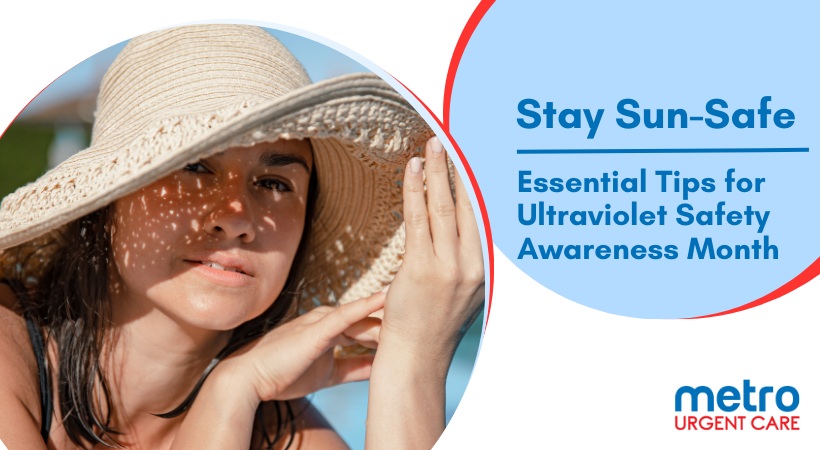July is for sure the time for the beach and barbecue. But this is also the time when you have the risk of high exposure to the harmful ultraviolet (UV) rays of the sun, which is the primary reason for skin cancer.
There is a strong connection between UV radiation and skin cancer. Every year in the US alone, almost 3.5 million people are diagnosed with skin cancer, and the numbers are increasing. To create awareness about this, July has been named Ultraviolet Safety Month by the US Department of Health and Human Services. The main aim of July UV safety awareness month is to educate people about how harmful UV rays are to your skin and explain the ways to protect yourself from UV rays.
Understanding UV Rays and Their Effects
Ultraviolet rays are invisible radiations emanating from the sun, sunlamps, and tanning beds. Cells in the epidermal layer of the skin are greatly damaged by these rays, thus causing innumerable health issues like skin growths, cataracts, genetic damage to the skin, age spots, sunburns, and, most troubling, skin cancer.
There are three types of UV rays:
- UVA - These rays penetrate deep into the skin layers causing signs of aging, including wrinkles and fine lines. The amount of UVA increases during the summer and winter months.
- UVB - These rays easily penetrate the skin's outermost layer, leading to damage of skin cells, which is the primary cause of various types of skin cancers, skin thickening, and sunburn. They also impact the immune system and the eyes.
- UVC - This is the strongest ray of the UV spectrum radiation. These rays are blocked by the atmosphere’s ozone layer. Even minimal exposure to these rays can cause eye injuries and severe skin issues.
Risk factors of UV Radiation
UV radiation can affect people of all ethnicities and skin colors. But you should take additional precautions if you have:
- Already been treated for skin cancer
- Pale skin
- A family member who had skin cancer
- Light brown, blond, or red hair
Some medications increase sun sensitivity. Talk to your doctor about sun care precautions. Stay in the shade even on an overcast day, as 80% of the sun’s UV rays pass through the clouds.
How Is UV Radiation Related to Skin Cancer?
Apart from UV radiation from the sun, many people are exposed to UVA and UVB radiations from indoor tanning beds and lamps. People who use these beds frequently and for a long time are at a higher risk of UV exposure. Indoor tanning is responsible for almost 400,000 skin cancer cases in the USA annually, as reported by the US Department of Health and Human Services.
8 Ways to Protect Yourself from UV Rays
- Use the right sunscreen – Use sunscreen on every exposed part of the body, even if it is cloudy. Choose sunscreens with high SPFs for better protection.
- Make sure to wear sunglasses – Sunglasses protect your eyes from the glaring UV rays, which might cause cataracts and other eye problems. Shop for sunglasses that can block 99-100% of UVA and UVB rays.
- Wear protective clothing – Wear long-sleeved dresses and long pants. This minimizes skin exposure to harmful UV rays.
- Invest in a wide-brim hat – Make wide-brimmed hats your favorite accessory. The brim not only covers the face but also protects the scalp and the ears.
- Avoid spending time in the sun between 10 am and 4 pm – This is the time when the sun’s rays are the strongest. If you need to be outdoors, take proper precautions for minimal sun exposure.
- Try avoiding indoor tanning – Tanning beds and sun lamps emit UV rays that can cause skin cancer. Refrain from such tanning equipment and reduce the chances of skin cancer.
- Don’t trust contact lenses – Many contact lenses come with UV protection. Even if you have such lenses, wear your sunglasses while stepping out in the sun.
- Constantly check your skin out – Skin cancer is treatable at an early stage. Keep an eye on your skin to see any kinds of changes in skin color or texture.
Protect Your Skin and Eye Health with Metro Urgent Care
Discover the power of prevention at Metro Urgent Care! Safeguard your skin and eyes from harmful UV rays with our expert care. Don't hesitate; take action now to ensure a healthier tomorrow. Schedule your appointment, and let us help you protect your skin and eyes for a brighter and safer future. Take action today and give your skin and eyes the care they deserve!


